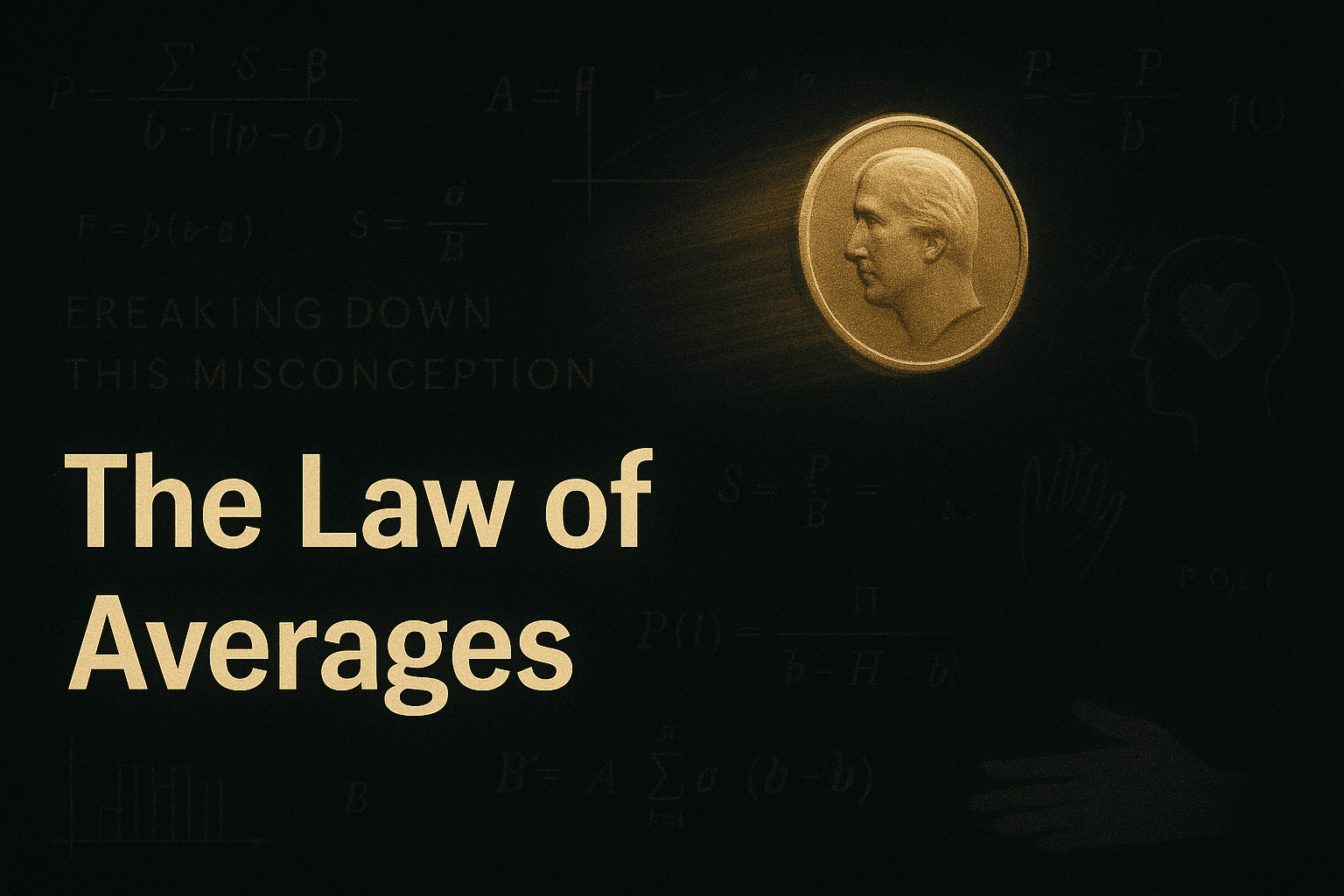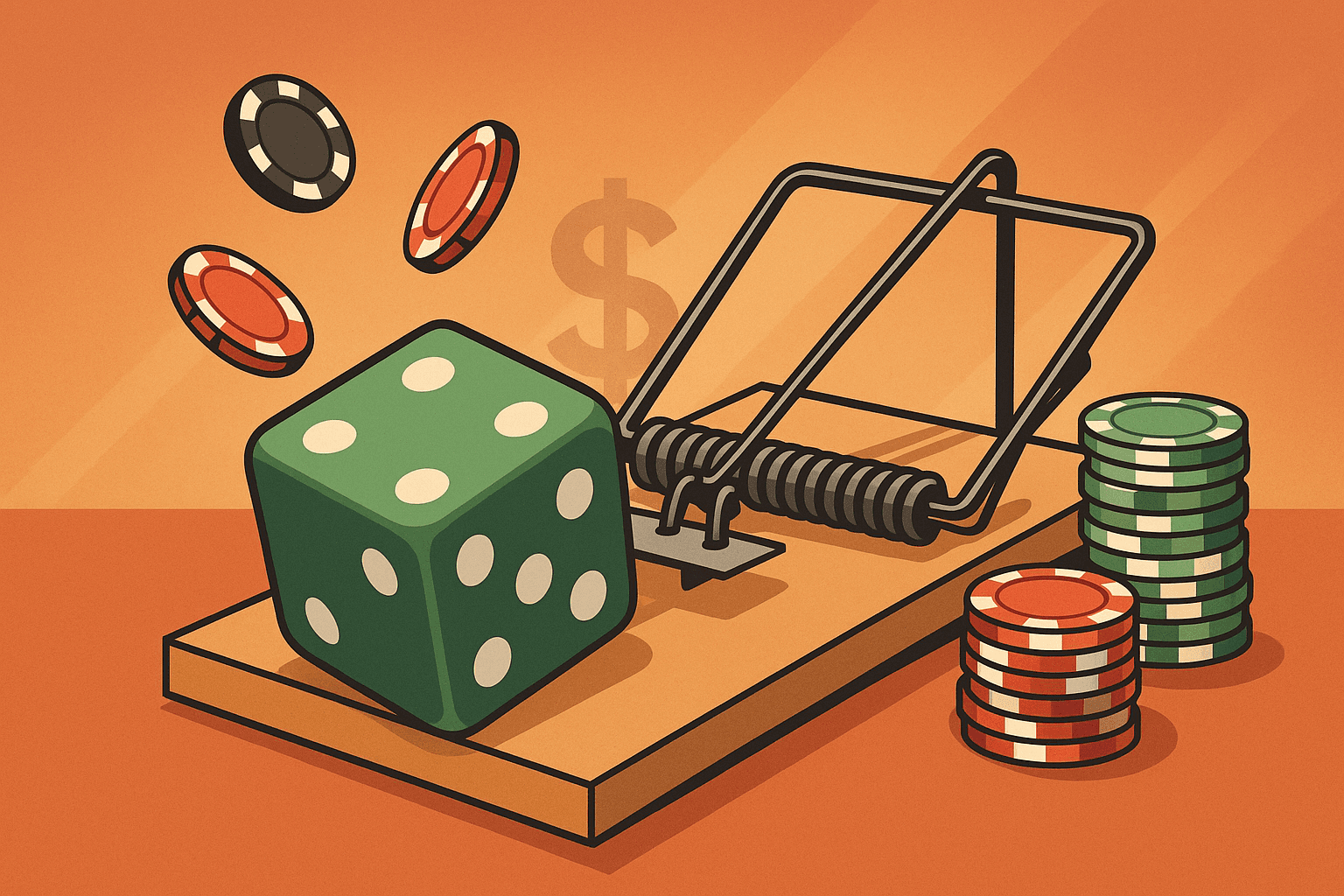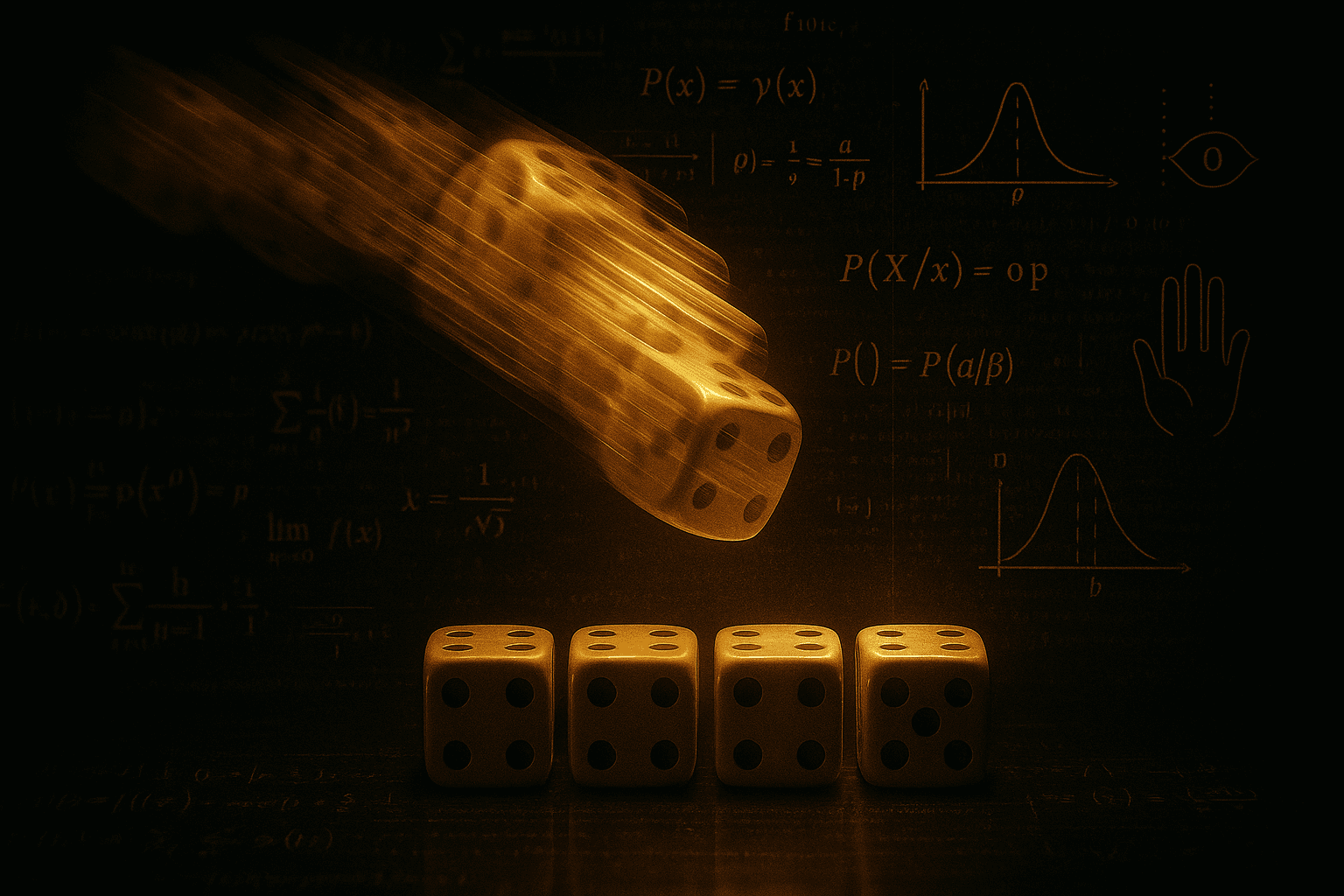The Law of Averages: The Trap That Costs Gamblers Billions
The Misconception Worth Billions
The law of averages is generally easy to understand, or at least it sounds that way to us. The first problem we have with the law of averages is actually what this combination of words makes us believe. The first step in the law of averages is the false intuition it creates in us. What do I mean? How many times have we thought or heard the following sentence: "After five reds in a row, black has to come up now!" This is one of the most common misconceptions, and not just in the gambling world, and it mainly causes losses. But with a touch of interest, this belief is responsible for much of the excitement we have in gambling. So welcome to the world of "law of averages" beliefs - the illusion that makes the gambling experience so addictive and that casino love so much!!

Probability has no memory — the world forgets every flip, every spin, every roll.
Breaking Down This Misconception
The law of averages is the belief that if a particular outcome hasn't occurred for a long time, it's "due" to happen soon to "balance out" the statistics. It's that feeling that tickles our hand that something hasn't happened for a very long time so it must happen. But also the opposite - that if something repeated itself too many times, it must stop. And it really does sound logical. For example, if a coin landed on tails five times in a row, you'd agree with me that it sounds more logical and more intuitive that the next round will be heads. Or if a certain number hasn't appeared in 50 lottery draws, there's a feeling that the probability is in its favor. This is a mistake - probability simply doesn't work that way.
The moment that, for example, "tails" came up five times, we believe that the next round is statistically connected to the previous round. There's a feeling that the world remembers what happened before and that there's a kind of "law of conservation of probability" operating all the time. And this is the important point: the dice, the roulette ball, the cards, and the coin - don't remember and don't know what happened in the previous round. They have no memory, no consciousness, and certainly no "balancing" mechanism that makes a particular outcome more likely just because it hasn't occurred recently. Every spin, every flip, every roll - they're completely independent events.
This is confusing - a coin has two sides, and if this coin is 100% balanced, there's a 50% chance it will land on either side. There really seems to be a convincing explanation for why the coin does remember what happened last time. And this is exactly the trap.

When the game feels winnable, the trap is already set.
The Classic Mistake: Gambler's Fallacy
This mistake is so common and harmful that it has an official scientific name: Gambler's Fallacy. This is the belief that it's likely a certain outcome will occur if it hasn't happened recently, or conversely, that it's likely something won't happen if it's happened several times. Let's understand this with a classic roulette example:
Imagine you're standing at a roulette table, and the ball has landed on red 7 times in a row. A gambler next to you sees this and says confidently: "There's no way it'll land on red again! I'm putting all my money on black - it's a sure thing!" His intuition tells him that after so many reds, black "must" come up to balance things out. Sounds logical, right? But this is exactly where our intuitive logic misleads us.
The mathematical truth is much simpler and more sobering: the probability that the ball will land on black on the next spin remains exactly the same - 48.6% on a European roulette wheel (with one zero), or 47.4% on an American wheel (with zero and double-zero). The thing is, the ball simply doesn't remember, and every spin is a completely independent event. Every spin, from the ball's perspective, is the first spin. But remember - from the casino's perspective, your first spin of the evening is probably the ball's 4000th spin. Just like with slots, there's no such thing as a first spin in a casino that operates non-stop.
So Why Does Our Brain Fall for This Trap?
Question: Will you act according to the law of averages next time? Most of us probably will - first of all for the enjoyment, but more than that, our brain is programmed to look for patterns everywhere. Pattern recognition is what allows us to survive, and it's what enabled early humans to survive or conversely to be preyed upon. Those who identify patterns in the world achieve better results with certainty. This is a clear evolutionary advantage. If you learned to recognize that if there's a roar, there's probably a lion, your chance of survival is much greater.
But pattern recognition is completely worthless when dealing with random events. When we see a series of 7 reds at roulette, our brain immediately alerts us: "This isn't normal! This can't continue! Something has to change!" This is what psychologists call "representativeness bias" - we identify a small sample as representing the overall distribution. We notice that the ball landed on red 7 times in a row. Instead of telling ourselves "every spin is the first spin," we imagine it as the eighth spin out of ten, ensuring probability is preserved. But the probability belongs to the casino where hundreds and millions of repetitions occur daily, not in our specific moment.
And here "Illusion Of Control" also enters the picture - the feeling that we can understand, predict, or even influence random events by identifying patterns. Our brain simply doesn't like accepting that some things are truly completely random. It prefers stories and patterns over pure randomness. This causes us to invent connections that don't exist and to see meaning in what is actually just statistical noise.

“The Moment Before Probability Breaks” — where math, chance, and human intention collide in a single suspended instant.
See It in Action
Roulette: How Casinos Profit from Your Mistake
The reason casinos have screens displaying the last 10-20 results is precisely to make the law of averages take over your decision-making. After all, every spin is the first spin from the ball's perspective, so why do we need this information at all? Does this information allow us to know what the next result will be? The screens exist to encourage us to identify patterns.
It's a brilliant method, but at the end of the day it won't lead us to win - that's connected to something else I like to call: luck 😊
A famous example that is likely to occur again tomorrow happened in 1913 at the Monte Carlo Casino. The roulette ball landed on black 26 times in a row! The odds of this happening are less than 1 in 66 million. Now what happened is that as the streak lengthened, more and more gamblers placed enormous sums on red, certain it "had" to come up now. Each one thought they were taking advantage of a golden opportunity. According to historical accounts, gamblers lost millions of francs that evening. The event was so dramatic it got its own name - "Monte Carlo Fallacy," another name for Gambler's Fallacy.
But here an interesting point arises - if black came up so many times, isn't that itself very rare? Or does anyone even think there's a chance black will come up 28 times in a row? And this is exactly the interesting point - the probability of getting, for example, "tails" 10 times is 1 in 1,024, which is very rare. So if I see it came up 9 times, from my perspective it's obvious it won't come up "tails" next time, but every flip from the coin's perspective is the first flip. There's no influence from the history of flips. And this really isn't intuitive, and it doesn't even sound logical when you say it like this. But it's the truth!
Lotteries: "Cold Numbers"
In lottery games, the mistake takes a slightly different form. There are websites and apps that offer to track "hot numbers" (that appeared frequently recently) and "cold numbers" (that haven't appeared in a long time). The sellers of these systems try to convince you that this information has real value and that you can increase your chances through smart number selection.
But let's think logically for a moment: if the number 7 hasn't appeared in the last 100 drawings, do the balls inside the lottery machine know this? Do they have memory? Do they "remember" that number 7 hasn't come up? The clear mathematical answer is: no. In any fair lottery, every number has exactly the same chance of being drawn, regardless of when it last appeared - a week ago, a year ago, or never.
Poker: Falling into Tilt
In poker, this mistake takes a special form called "tilt." Imagine you're dealt AA (pocket aces - the strongest hand in poker), you put all your money in the middle of the table, and someone with 7-2 (the worst hand) gets exactly the cards they need on the board and beats you. This is called a "bad beat" - a significant loss with an excellent hand due to extreme bad luck.
After such a bad beat, our brain screams, "This isn't fair! I deserve compensation!" and many players continue playing more aggressively and loosely, feeling that the universe "must" pay them back. They believe that after such an unlikely losing event, they're surely "due" to win the next hands. But the cards don't remember what happened in the previous hand. Every new deal is a completely fresh start, with exactly the same odds.
Daniel Negreanu, one of the world's most successful poker players, once said something important: "The skill in poker isn't avoiding variance - that's impossible. The skill is continuing to play correctly even when the variance is against you." This is a deep understanding that the law of averages doesn't work in the short term, and that the ability to maintain mental discipline is critical to success.
What People Think vs. What’s Really True (in Numbers)
How to Avoid the Trap: Practical Tips
Now that we understand the mistake, let's talk about how to avoid it in practice. It's not always easy - we're fighting deep-seated tendencies in our brain here - but it's possible with awareness and discipline.
Repeat This Like a Mantra: "Every Round Is Independent"
The most important thing you can do is practice correct thinking. Every time you're about to place a bet, tell yourself: "This round is completely independent of what happened before." Practice thinking about each bet as if it's your first bet, regardless of the history. It's not intuitive, but it's mathematically correct. The ball doesn't remember. The cards don't remember. The dice don't remember.
Identify Dangerous Thoughts
Learn to recognize faulty thoughts in real-time. If you catch yourself thinking: "I'm due to win now," "After all these losses, surely now...," "There's no way this can happen again," or "The ball has to land on black this time" - that's a big red warning sign. These are exactly the signs that you're thinking according to the mistaken law of averages. Once you identify such a thought, stop, take a deep breath, and remind yourself of the facts: every round is independent, the past doesn't affect the future, and the universe doesn't owe you anything.
Set Limits in Advance - Not During the Game
Proper bankroll management is one of the most important tools against the law of averages. Decide in advance, before you start playing, how much money you're willing to lose. And when you reach that limit - stop. It doesn't matter what the results were. It doesn't matter if you lost 10 times in a row and you're sure "something has to come now." Decisions you make during the game, especially after losses, are almost always emotional and wrong. Decisions you make before the game, when your head is clear, are the right ones.
Don't Increase Bets After Losses
One of the classic mistakes is increasing bets after a series of losses, believing "things have to balance out." This is exactly the Martingale system we talked about - and we saw it doesn't work. The probability of winning hasn't increased just because you lost. If you're playing correctly, your bet size should remain relatively constant, or be based on a percentage of your bankroll - not on the feeling that you're "due."
Take Breaks After Extreme Events
If you've experienced a significant bad beat, a big win, or a long losing streak - take a break. Let your brain calm down. Your emotional state after extreme events is not good for making rational decisions. You're much more likely to think "I deserve this" or "Things have to balance out." A few minutes of break, going for a walk, getting a drink - this can save your bankroll.
Learn to Know Yourself
Everyone has their own weak points. Some people fall for the law of averages mainly after losses, others after wins. Some fall for it at roulette but not at poker. Learn to recognize where you're most vulnerable, and be especially alert in those situations.
The Bottom Line
The law of averages is not a law - it's an illusion. But it's a particularly powerful illusion because it connects to the natural way our brain works. We want to see patterns and believe the universe is fair, that we "deserve" something after a streak of failures. But in the gambling world, reality is more cruel: every event is independent, the past doesn't affect the future, and the odds remain constant regardless of what happened before.
The dice, the ball, and the cards don't remember. They don't correct. They don't owe you anything. Every round is a completely fresh start. Remember this the next time you're at a gambling table, considering a lottery ticket, or playing online. Stop for a moment and ask yourself: "Am I making this decision based on real mathematics, or am I falling into the trap of the law of averages?"
The successful gamblers - those few who actually manage to profit over time - are those who understand this deeply. They make decisions based on real probabilities, not on feelings or beliefs that the universe keeps score. The honest answer to the question "Am I falling into the trap?" can be the difference between enjoying responsible gambling and heavy losses resulting from faulty thinking.
Next Article in the Series: In part two, we'll dive deep into the psychology and mathematics behind the law of averages. We'll discuss the Martingale system, see precise probability calculations, and compare where this mistake causes the most damage in different games. [Link to next article]